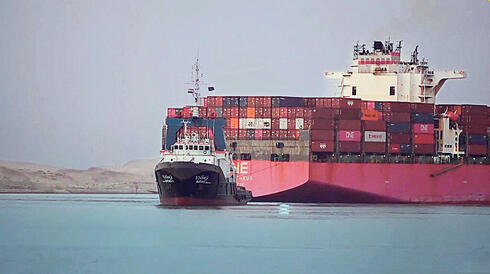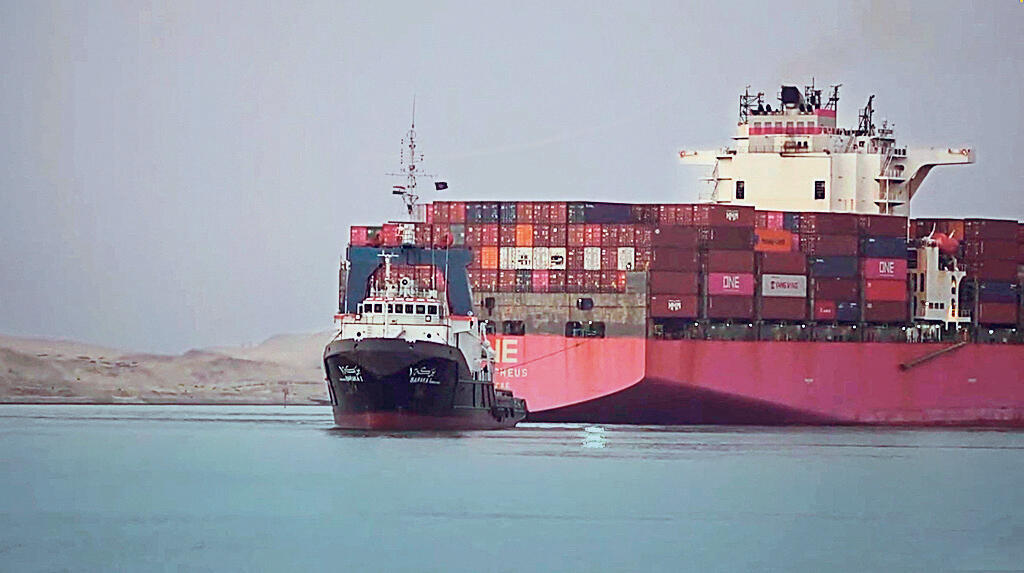
Half of shipping routes to Israel through Red Sea halted due to Houthi threat
Shipping giant Maersk announced that it will stop transporting goods through the Suez Canal following attacks by the Houthis in Yemen, and was quickly followed by two other large shipping companies, all of which is expected to increase the price of goods arriving in Israel
“Following yesterday's attempted attack on the Maersk Gibraltar ship and another attack on a cargo ship today, we have instructed all Maersk ships that are supposed to pass through the Bab el-Mandeb Strait to halt their journeys until further notice,” said the second-largest shipping company in the world, Maersk, which owns a fleet of 300 vessels, in an announcement on Saturday. Given that approximately 12-14% of global trade passes through the Suez Canal, this is a significant event that could impact global trade routes and commodity prices in Israel and across the globe.
For Israel, the repercussions of this incident could be even more substantial. According to Dr. Elyakim BenHakoun from the Industrial Engineering and Management Faculty at the Technion Institute of Technology, "About 99% of goods (in terms of cargo volume) reach Israel by sea, and around 40% of the cargo arriving in Israel passes through the Suez Canal." According to BenHakoun, "The consequence of stopping ship traffic in the Red Sea is to circumnavigate Africa, leading to an extension of shipping times by approximately two weeks to a month, depending on the destination region, vessel speed, and ship category. This roughly translates to an additional cost of $400,0000-$1 million per ship."
Yoram Sebba, the president of the Israel Chamber of Shipping, estimates a similar cost for each ship: "If companies choose to sail around Africa, the net added cost is estimated to be around a million dollars per voyage. If a certain route is canceled, the cost will be about half, as there is no fuel consumption. All damages to importers and exporters and their economic impact on end consumers must also be added to the total expenses. Finally, those who profited from the regular route will suffer, such as the Suez Canal route."
After Maersk's announcement, German company Hapag-Lloyd also declared the suspension of its ships' passage in the Red Sea, at least until Monday. Together with MSC, these are some of the world’s largest shipping companies. Sebba notes that, "This is already half of the routes to Israel (passing through the Red Sea). Moreover, in container routes, there are cargoes to other destinations on the same route, and will therefore have global consequences beyond Israel." On Saturday, shipping company CMA CGM also announced the cessation of its routes in the Red Sea.
The impact is already evident
BenHakoun, who also serves as an advisor in the maritime sector and as a maritime consultant for the World Health Organization, explains, "Maersk is one of the leading companies in the world (the second-largest in shipping). Its decision will reverberate in other places - in insurance companies and in companies that have a certain level of ownership or responsibility for the ship's body or operation (shipping companies, chartering, etc.)."
BenHakoun says that the impact on fuel prices is already apparent: "The impact has already led to doubling the insurance rate for crossing the Red Sea from 0.1-0.2%. This will prompt a definite response in terms of risk calculations, which will result in a global problem affecting the entire trade route. This will affect countries involved including via direct costs (fuel, insurance, crew salaries, schedules, etc.) and indirect costs of extra stock at sea, delays in production related to the supply chain, and more."
The immediate question arising from the decisions of shipping companies is what the impact will be on consumers. BenHakoun estimates that in the near future there may be a rise in prices, but that prices are expected to later stabilize. "The immediacy of the impact on the consumer depends, therefore, on the level of competitiveness and the structure of the supply chain. Prices are expected to rise for one to two quarters and then stabilize again, either through alternative shipping routes or the development of alternative supply options."
Sebba estimates that the frequent changes in companies' decisions make it difficult to determine how customers will be impacted by the halting of ships passing through the Red Sea. "Time will tell. Decisions change every day, and the central question is the level of competition between different shipping lines."
According to BenHakoun, the impact of delays in supply routes may extend to other sectors in the industry, mainly due to disruptions in crude oil transportation and fuel. "Since fuel is a raw material for a wide range of sectors, there may be additional economic impacts, especially in industries that are heavy energy consumers not based on natural gas or green energy (most natural gas is transported by pipelines and renewable energy production is local). The fuel supply shortage will benefit the Saudis, but it will adversely affect everyone else whose transportation depends on passing through the Bab el-Mandeb Strait."
Another crisis that could lead to a global increase in transportation prices is occurring on the Panama Canal. According to Sebba, "a prolonged drought has created a water shortage for operating the canal, resulting in only half of the ships passing through. All alternatives are expensive, for example, transporting goods overland through the United States or bypassing South America."














